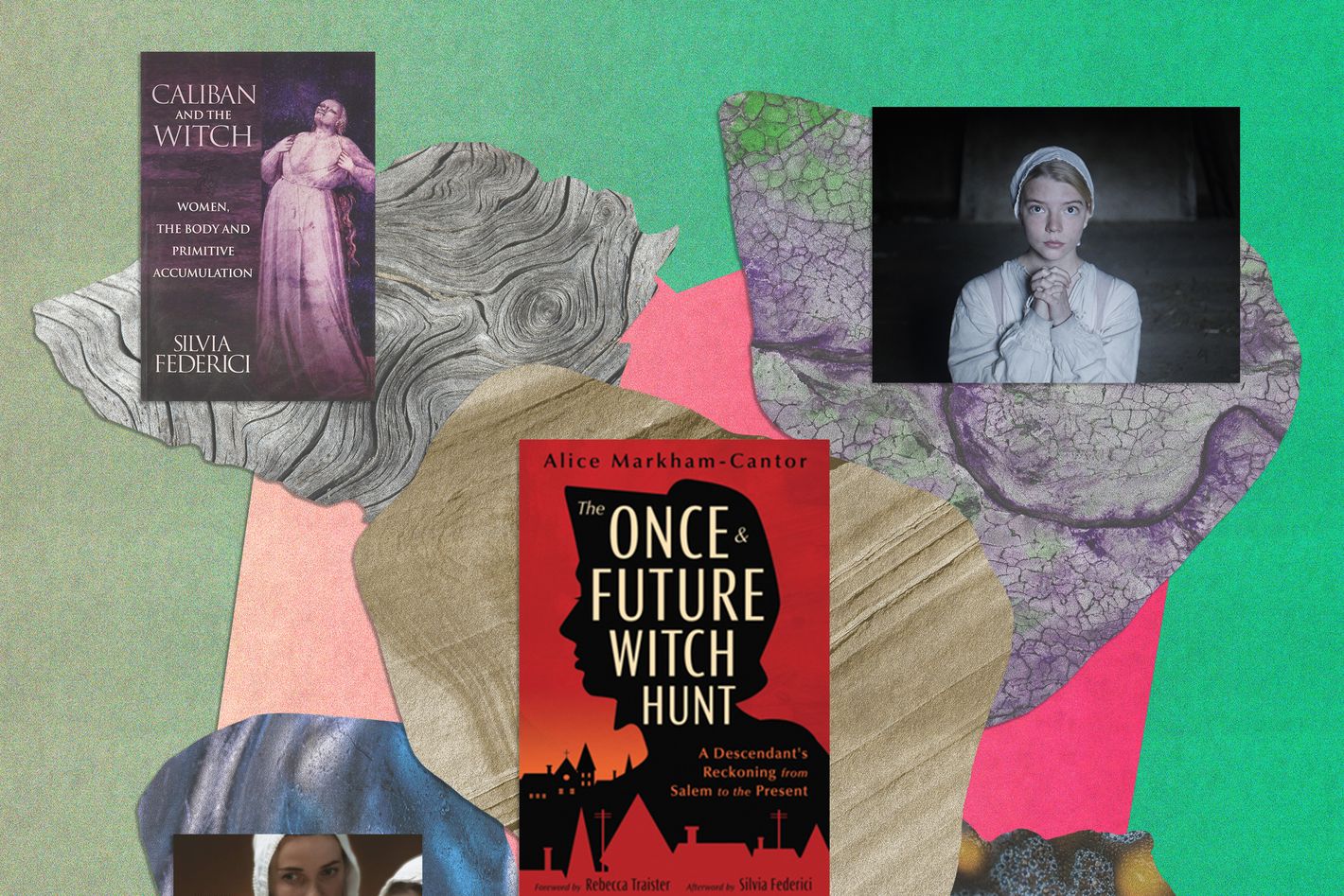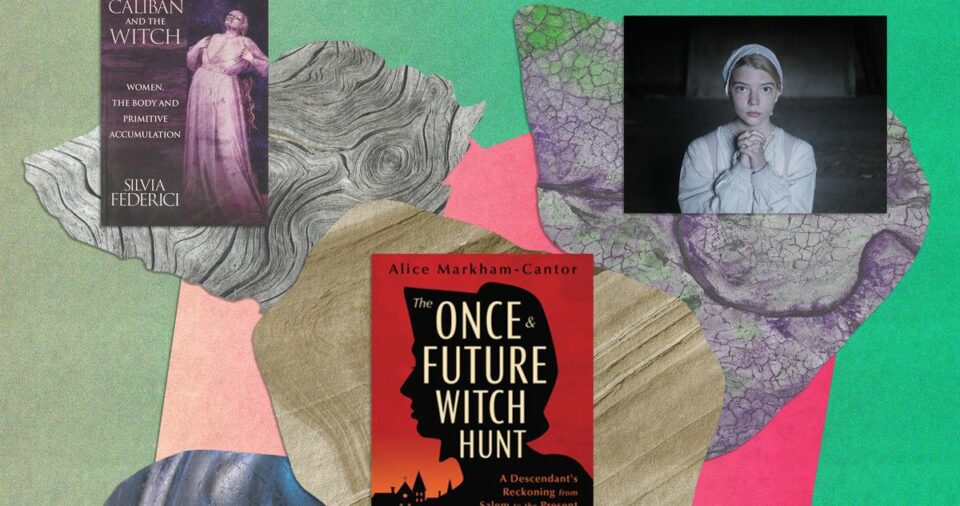[ad_1]

When she was in the eighth grade, Alice Markham-Cantor discovered that she was the descendant of Martha Carrier, a woman hanged in Salem in 1692 for witchcraft. Back then, she knew that it would earn her bragging rights at school the next day. But she had no idea that telling Carrier’s story would become the yearslong pursuit of her adulthood, beginning with an undergrad-thesis project and culminating in her debut book, The Once & Future Witch Hunt: A Descendant’s Reckoning From Salem to the Present. “When people ask how long I’ve been working on this, I’m never quite sure what to say because it’s been off and on for so long,” says Markham-Cantor. “But the story is one I’ve been thinking about for a decade.”
As you might guess from the title, this deeply researched book expands beyond the Salem witch trials into the modern witch hunts that take place today. The story fits within two genres, alternating chapter by chapter between historical fiction (Markham-Cantor’s telling of Carrier’s story) and narrative nonfiction, in which she outlines her research process. While the book is complete, her research very much is not: Markham-Cantor is involved in the International Network Against Accusations of Witchcraft and Associated Harmful Practices and is now preparing for a September conference on best practices for preventing witch hunts.
Markham-Cantor is keen on correcting the narrative — Carrier’s, of course, but also that of the Salem witch trials, a story that has been told so many times, and in so many ways, in part because there is such a wealth of documentation of it. But there’s also plenty of highly inaccurate conjecture. As a fact-checker for New York Magazine by day, Markham-Cantor is driven to let the world know that Abigail Williams was 11, not 16, and that there’s no evidence Tituba ever taught magic or even expressed a single non-Christian view. “People tend to think that witch hunts are about superstition,” says Markham-Cantor. “It’s always presented like, ‘Oh my God, can you believe what the Puritans believed in?’ But belief is not the operative factor. Moments of economic crisis can have ripple effects that thread themselves through existing belief systems and help cause witch hunts.”
Below, she shared the works that helped shape her book with the Cut.
Caliban and the Witch, by Silvia Federici
My book is hugely in conversation with Caliban and the Witch. That’s the mother tome of economic analysis of the great witch hunts of Europe and of connecting witch hunts explicitly to the rise of capitalism and understanding how they fed each other. That was the piece I was missing in terms of understanding how the witch hunts, the slave trade, and colonialism feed into each other and have these disparate but interconnected effects on the social and economic systems of three continents, how they are also entwined and are spurred by the wage crisis in Europe and the influx of silver from the mines in South America, and just the true interconnectedness of the economic system. It’s deeply useful in understanding why the witch hunts happened when they happened, because people tend to think of them as a medieval problem.
There were actually very few witch hunts in Europe in the Middle Ages. The Protestant Reformation plays into this as well. There are a couple of economists who have a theory about how the witch hunts are partially spurred by capitalists and Protestants fighting for market share of who’s better at besting the Devil. There are many aspects to this, but the way that capitalism fundamentally changed the position of women in Europe — as it was changing the position of so many people throughout the world — is crucial. And the way that the witch hunts feed back into capitalism by reconfiguring women’s labor.
The Witches, by Stacy Schiff
The Witches is the most comprehensive, but also readable, book that I’ve read about Salem. It does an incredible job at giving you a real picture of who these people are, what’s going on, and deals with every character. I was following Martha’s story, so I really was not dealing with everybody. Stacy Schiff gives the true bird’s-eye view, and it’s amazing. She’s also really nice. I emailed her out of the blue when I was working on the book and was like, “Do you have any information that you could share with me about Martha Carrier?” This was when I was working on the thesis in college, before I knew it was going to become a book. She sent me a useful folder.
The Witch, directed by Robert Eggers
I’m gonna give a shout-out with conflict, with complexity, to the horror movie The Witch. Here’s what I think it does phenomenally: It really represents the Puritan mentality. It accurately is like, This is how Puritans were thinking; this is what they were afraid of. It represents the various witch beliefs. The Witch does an amazing job at visually representing Puritanism. For most of the movie, they are not in a Puritan community — it’s just at the beginning. But on the level of the clothes that they wear; the way that they talk to each other; their relationship with God and with faith, where this is a desperately real thing that is part of daily life; plus everything that they’re afraid of — it’s Puritanism.
For most of the movie, they’re living in a house at the edge of the woods because they’ve been expelled from the community, which is a thing that Puritans did to each other. They could try to run you out of town, which they tried to do to Martha and her husband. But living at the edge of the woods is so important for understanding that the Puritans, on some level, were afraid of the land that they were on. They thought that this was the Devil’s land.
There’s this really interesting fearful interplay that shows up in their relationship with Indigenous people in the Americas, but also with the way that they relate to nature, that I think the movie shows really well. I don’t want to say why I hate the last five minutes because it would be a spoiler, but for most of the movie, you don’t know if this is just in their heads or not. I think that that’s actually how it would have felt for the Puritans in Salem. The whole question of what’s real, and how do we decide what’s real, is the fundamental question of Salem, and the movie represents that really well — up until the last five minutes.
“Lilias,” by Heal & Harrow
I create playlists while I write for every book I work on, every story I work on. For this one, the title of the playlist is The Devil Is a Liar, which is a quote from Martha in her preliminary hearing.
“Lilias,” by Heal & Harrow, just came across my Spotify. I have not listened to anything else by this artist. I don’t know who they are. But it’s about witch-hunting, almost exclusively. My playlist is broad. I have a Hozier song on there, the recomposed–by–Max Richter Vivaldi album, James Taylor. It’s truly vibes-based. “Lilias” is the least vibes-based one in that it is explicitly written from the point of view of someone who has been accused of witchcraft, and there’s a refrain in it that goes, “And if I am a witch, will the Devil help me now?” The Puritans are existing in this wonderfully deranged logic position where, on the one hand, they hyperlogically explain everything they do. Cotton Mather ties himself in theological knots to explain what’s happening. And at the same time, they miss super-logical things, or what we would consider to be super-logical things. If these people are all the Devil’s servants, is he now just abandoning them? Does that make sense in your vision? And they would be like, “Yeah, well, the Devil doesn’t actually care about them.”
Salem
I can’t get through an episode without laughing very, very hard at things that I’m not supposed to. You know how I was like, “Oh, The Witch really represents the Puritan mentality”? Salem could not represent the Puritan mentality less. It’s so bad it’s enjoyable for me. They’re not trying to be historical at all. They’re playing so fast and loose that it’s almost its own story. And that’s how you have to engage with it. It’s fun.
Not to be a fact-checker on main, but I definitely am very fueled by the urge to correct the record in Salem’s case. There is so much misinformation about Salem. We should talk about The Crucible briefly. Incredible play. Phenomenal work, Mr. Miller. But it’s not a historically accurate story of Salem. He didn’t intend it to be; that’s not what it’s for, but we teach it in high school as if it is. I wish that we presented it with the understanding that this is a play about McCarthyism, not about Salem, on a really fundamental level.
More From This Series
- Alexandra Tanner’s Worry Will Worry You Just the Right Amount
- Jezz Chung Wants You to Change
[ad_2]
Katja Vujić , 2024-05-20 23:03:23
Source link



